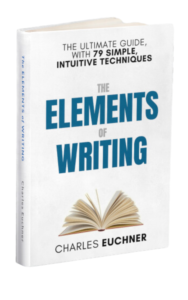Before developing The Elements of Writing, I used to talk about the ABCs of Writing.
I thought the ABCs offered a good device for people to remember all the essential skills of writing. So for each letter of the alphabet, I created a cluster of skills around a major theme. A stood for Action, B for beats, C for characters, D for details, and so on . . . all the way to X for eXplaining (lame, I know), Y for yo-yoing, and Z for “zip it up.”
As I was developing the ABCs, I realized that some kind of moral lurked behind each of the skills. Maybe understanding these values — which go beyond the writing process — would help people understand and remember the writing skills. So I gathered this list:
Action—Move! Do something! Seize the moment!
Beats—Understand how both sides of everything work, together, to produce each other and something new.
Characters—Know how people matter.
Details—Specifics matter more than abstractions.
Editing—Get rid of noise and clutter. Help people navigate through complexity without undue difficulty. Don’t make readers look for the pony, unless the shit’s part of the benefit of reading.
Form—Get everything in the right shape
Grammar—Show respect.
Hanging (cliffhangers)—Keep people involved. Make them crazy with anticipation.
Into the World of the Story—Respect people’s places. Understand Churchill’s dictum that first people make places, then places make people.
Jazz Riffing—Play, but follow rules when taking part in even the wildest activities.
Kinesthetic, Visual, and Auditory Senses—Engage people’s whole bodies.
Leads—Invite someone in.
Metaphors and Similes—Show people new things with reference to familiar things.
Narrative—Bring people along for a journey.
Order and Numbers—Put first things first.
Paragraphs—Do everything with singular purpose.
Questions—Understand that questions often matter more than answers.
Research and Reporting—Go wherever you can find information.
Sentences—respect your reader enough to tell what you want her to know, directly: Who does what to whom?
Thesis—Explain what you want to explain.
Unexpected—Tell me something I don’t know.
Verbs—Be active.
Words—Be as simple as possible, but no simpler. (Thanks to A. Einstein for that one.)
eXplaining—Break things down into manageable pieces, and present them in the right sequence.
Yo-Yo—Shift back and forth from scene to summary, from sensory details to abstract ideas.
Zip It Up—Don’t tarry too long. When the journey is over, say so long.


